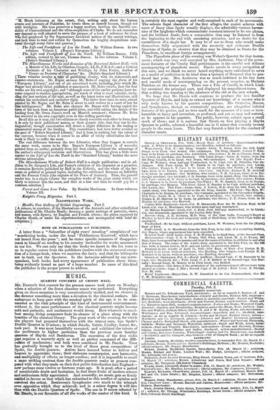MU S IC.
QUARTET CONCERTS AT CROSBY HALL.
DANDO'S first concert for the present season took place on Monday; when a selection of the finest chamber music was performed- Everything given on these occasions is very conscientiously studied, and we observe in the director something more than a devotion to the classical authors. His endeavour to keep pace with the musical spirit of the age is to be com- mended as the vital principle of this kind of instrumental entertainment: without it, the mere performance of the classical quartets might become cold and pedantic, and excitement Would droop. Here whatever is excel- lent among-living composers finds its-chance of a place along with the beauties of the classical library. The great work of the evening, for which the players had prepared themselves with the utmost care, was Spohr's Doxible Quartet in D minor in which Dando, Gattie, Lindley, Lucas, &c., took part. It was most beautifully executed, and exhibited the talents of the performers in higher perfection than the previous more familiar quartets of Haydn and Beethoven. The execution of the first violin part requires a masterly style as well as perfect command of the diffi- culties of mechanism; and both were combined in Mr. Dando. Time has gradually brought us to the level of those great compositions of Spohr, the double quartets. Artists have learned better to deliver and hearers to appreciate them; their elaborate counterpoint, new harmonies, and multiplicity of effects, no longer confuse; and it is impossible to recall a more striking contrast than the double quartets make at present corn- pissed with what theymade on their first public introduction into England— new perhaps some twelve or fourteen years ago. It is good, after a period of considerable doubt and hesitation, to find these fruits of modern science and enthusiasm folly appretiated. And assuredly, no music gets so firmly settled in favour as that which has submitted to this conflict of opinion and survived the ordeal. Beethoven's Symphonies owe much to the triumph over opposition which they achieved; and in a minor degree it will fare thus with the Double Quartets of Spohr. The one in D minor selected by
Dando, is our favourite of all the works of the master of this kind. It is certainly the most regular and well-sustained in each of its movements. The solemn fugal character of the first allegro, the quaint scherzo with more of fancy than Spohr usually displays, the admirably-various harmo- nies of the larghetto which communicate constant interest to its one phrase, and the brilliant finale, form a composition that may be listened to from the beginning to the end with unceasing attention, and no desire for the curtailment of a single bar. It may be of use to those who would make themselves fully acquainted with the masterly and elaborate Double Quartets of Spohr, to observe that they may be obtained as Duets for the Pianoforte, in excellent foreign arrangements.
The Pianoforte piece of the evening was Weber's Quartet for that instrtr- ment; which was very well executed by Mrs. Anderson. One of the prom- inent features of the Crosby Hall performances is the careful and delicate accompanying of pianoforte music. Dando excels in every occupation of this sort; and we think we never heard anything more calculated to serve as a model of perfection in its kind than a Quintet of Hummel that he pro- duced last year. Mrs. Anderson was as much indebted to his fine taste and careful mode of accompanying on the present occasion, as Madame Dulcken on the former one. There was a Trio of Corelli, in which Lind- ley sustained the principal part, and displayed his magnificent tones. So that nothing was wanting to the admirers of the old or the new schools. We hope that Mr. Dando will continue to produce the less fsmiliar Quartets of Haydn, and help to extend our knowledge of a master who is only truly known by his quartet compositions. His Oratorios, Masses, and Symphonies, though so extensively popular, are altogether inferior features of his genius, and no true mark for the measure of a man so inex- haustible in fancy and invention, so profound, and yet so easy and natural, as he appears in his quartets. The public, however, subsist upon a small stock of them; and it is curious that Sivori, on first playing a Haydn Quartet in public, selected a beautiful one in G minor that scarcely twenty people in the room knew. This fact may furnish a hint for the conduct of chamber music.


























 Previous page
Previous page